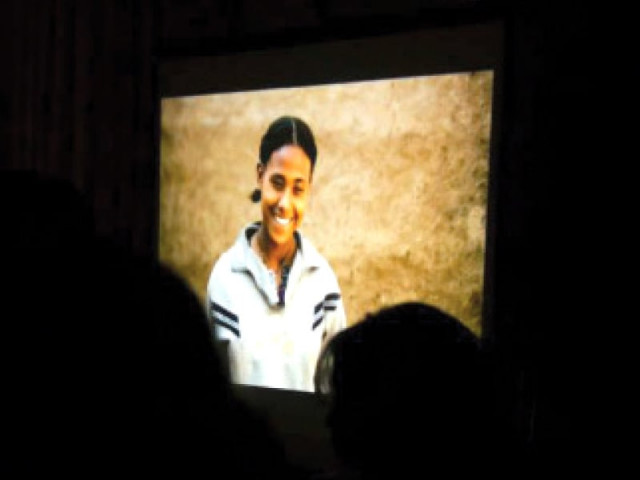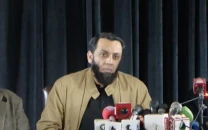The education: Way to school is way to go
Concerted action needed for pulling girls out of poverty: panelists at film screening.

A scene from the movie during its screening. PHOTO: EXPRESS
The voice-over carry a significant and staggering statistic: “A girl born on planet Earth today has a one-in-four chance of being born into poverty. And without education, that is where she will stay.”
The words are from the 2013 film “Girl Rising” which has spawned a global movement for girls’ education since its release, and they echo across the room at Kuch Khaas, where portions of the film were screened for public on Thursday as the screen faded to black.

The film’s message that girls’ education can help change the world for better is extremely relevant to Pakistan —a country with the third largest number of out-of-school girls in the world.
Around 15 million or two-third of Pakistan’s 25 million out-of-school children are girls, according to Alif Ailaan, a Pakistani alliance and communications campaign for education.
The Pakistani society itself is deeply conflicted when it comes to girls’ education as is often made obvious by a number of people who seem to dislike Malala Yousafzai, the young activist for girls’ education from Swat and got shot by the Taliban but survived.
This “deeply conflicted” nature of the Pakistani society makes it difficult to raise voice for girls’ education. But it must be endured and overcome somehow, Alif Ailaan Campaign Director Mosharraf Zaidi said at the post-screening discussion.
“The biggest thing is to bring more and more people on board [for the cause of education],” said Zaidi. “We should not compromise on what we want to achieve but we must moderate or regulate our message to bring all people on board.”

The film was screened by Girl Rising Pakistan, an initiative that plans to raise funds for girls’ education through screenings of the film in the country.
The Pakistani chapter taps into the international girl rising movement which is a “grassroots global action campaign for girls’ education, powered by girls, women, boys and men around the world who stand for equality,” according to Girl Rising’s official website.
“We are trying to use this film as a tool to generate debate especially on the issue,” said Samar Minallah, a documentary filmmaker.
Peace activist Tahira Abdullah said the government is not allocating enough funds for education and most of the allocated or disbursed money remains unspent at the end of each fiscal year.
She said the children who actually make it to schools get to study from curricula that are “irrelevant and hate-filled.” Moreover, the federal and provincial governments have not been able to implement Article 25-A which promises free and compulsory education for all the children between the ages of five and 16.
Urdu poet Kishwar Naheed said there was a need for meaningful action. “We should not just leave it at words and talks,” Naheed said. “We need to form groups that could contribute through action.”
Naheed also read her poem “They who even got scared of girls,” which talks about the cowardice of militants who blow up girls’ schools.
Published in The Express Tribune, January 11th, 2014.



















COMMENTS
Comments are moderated and generally will be posted if they are on-topic and not abusive.
For more information, please see our Comments FAQ